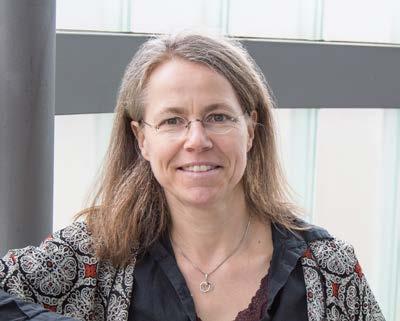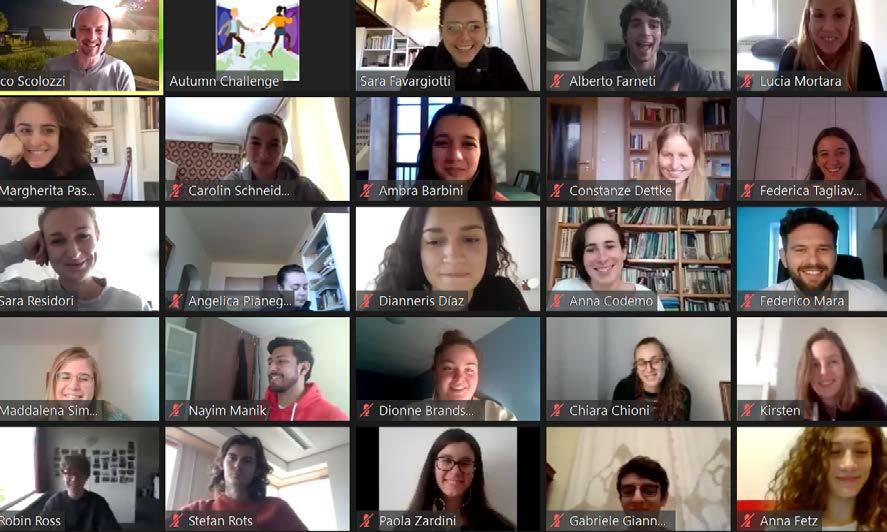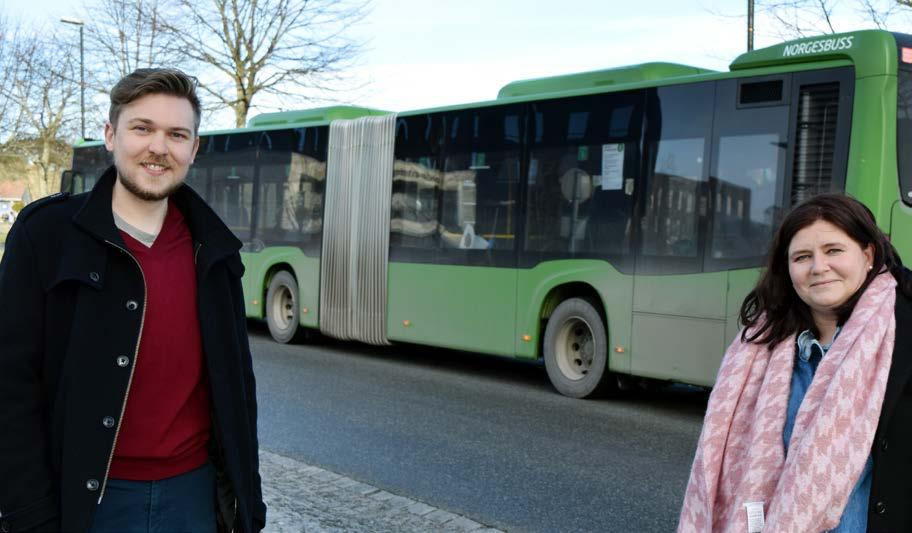
14 minute read
Research SMART European Regions
"SCIENCE WITH AND FOR SOCIETY, THAT IS OUR MOTTO"SMART-ER is the very first virtual research institute of ECIU University, which officially launched in February. Xavier Gabarrell Durany (UAB) is the scientific coordinator of this Research Institute for SMART European Regions. ‘Our best quality is our human capital. But it is also our biggest barrier.’ TEXT RENSE KUIPERS RESEARCH
First off, what is SMART-ER?
Advertisement
‘It is the first research institute embedded in ECIU University. Through a challenge-based approach we commit ourselves to design, develop and implement research linked to UN Sustainable Development Goal 11: sustainable cities and communities. The important distinction is: we focus on smart regions, not just smart cities. That allows us to better study entire ecosystems, instead of just urban areas or the natural environment. We look at the complete picture. The benefit of being embedded in the ECIU consortium is that we have the opportunity to learn from other regions. We all have our local accents but together, we are Europe. Because we are interconnected, we have a shared ground and understanding. If we share our thoughts, ideas and progress, we can all reach our targets.’
What is the current status of the institute?
‘We are in a preparatory phase. It is like being a teenager: we are exploring, building and developing. We are defining the roles, the programmes, projects and the overall framework. That is what this first year is meant for. And we want to create a community, since our best quality is our human capital. But it is also our biggest barrier. That is why it is a significant challenge to first create internal engagement. In the second and third year of SMART-ER, we aim for implementation on different levels, like pilots from the Seed Programme.’
What will the challenge-based approach mean for people who are or want to be involved?
‘It is definitely a new approach for a lot of researchers and it could possibly change their work fundamentally. Within academia itself, it requires a multi-disciplinary approach with different fields working together to solve societal problems. But also in our external engagement with stakeholders – be it NGO’s, municipalities, other local entities or citizens – we are moving our focus.
How does the pandemic affect starting up a virtual research institute?
‘The idea is to take the lessons we are learning now and profit from them in the future. I do not know what the future will hold, but I do
know that we need to meet people from other institutions physically – at least sometimes. We have included a staff mobility programme in our proposal, since part of creating a community is having mobility on different levels.’
How does being part of SMART-ER benefit researchers?
‘We think this approach can help researchers in being successful in a lot of national and international calls. Naturally, it is an everyday business for scientists to apply for funding. But having stronger links through and within this research institute helps them to do it in a more structured way, more efficiently. Obtain more, with less effort.’
When would this institute be a success?
‘We will take it step by step, so we have a few years to consolidate. It starts with internal engagement, followed by external engagement. There is no lack of excellent staff and students. But the success of this institute is intertwined with academia moving to a different playing field: the one where societal impact becomes more important than papers, projects and funds. Science with and for society, that is our motto. We put this discussion on the agenda. Even though we just started off, I hope that ECIU University will have more projects like this in the future.’
Who is Xavier Gabarrell Durany?
Xavier Gabarrell Durany, Professor in the Department of Chemical, Biological and Environmental Engineering at the Universitat Autònoma de Barcelona (UAB). He is scientific coordinator of the SMART-ER in the ECIU University. He leads the research group on Industrial Ecology called Sostenipra and the Fertilecity project. He is an expert in circular economy, urban agriculture, life cycle analysis, material flow analysis, and waste management.
XAVIER
GABARRELL DURANY
Research Mobililty Fund ready for relaunch
TEXT RENSE KUIPERS
After the pandemic got in the way of staff exchange and strengthening research collaborations, the Research Mobility Fund (RMF) is ready for a relaunch in 2021. ‘It comes down to communication and dissemination. People need to know that they can apply.’
VERA JACK
FERNANDES ZHE YANG
University of Aveiro Linköping University
The fund was launched in 2018. ‘With the main objective being to foster the network and strengthen the research collaborations amongst ECIU Universities,’ says Vera Fernandes, the RMF local coordinator from the University of Aveiro. ‘It allows researchers, PhD candidates and research support staff to travel abroad and collaborate with people from other institutions within ECIU.’
According to Fernandes and international coordinator Jack Zhe Yang (Linköping University), the programme has been quite a success since its launch. ‘The fund made it possible for nearly fifty visits within the ECIU network,’ says Yang. ‘What is quite interesting is the amount of time the researchers spent on exchange: fourteen days on average. That is quite something, considering their limited amount of time and the new minimum of five working days we set.’ Still, for one university the fund has been more successful than the other, adds Fernandes. ‘It comes down to communication and dissemination. People need to know that they can apply.’
That is why the coordinators want to spread the word about the Research Mobility Fund. ‘We have updated the website and we are having more internal meetings, to exchange best practices and learn from each other,’ says Yang. There is plenty of room to grow, he knows. ‘Applicants may apply for up to €5,000, but the average is €2,000. With the budget the universities put in, we can have about a hundred visits each year.’
For its relaunch this year, the fund has become more focused on research that fits in with the Sustainable Development Goal 11: Sustainable cities and communities. Fernandes and Yang hope international travel will soon be possible again, once the pandemic tapers off. ‘We have to keep hope things will get better soon,’ says Fernandes. ‘This form of staff mobility definitely pays off in researchers submitting grant applications together, knowledge exchange and stronger collaborations.’
If you’re looking for more information about the Research Mobility fund and/ or want to apply, go to this webpage:
https://www.eciu.org/for-university-staff/ researchers-mobility-fund
Challenge-based learning is at the heart of ECIU University. What does it look like in practice? ‘Learners will work on issues that have no solutions yet,’ says Andrea Brose, who leads the work package on challenge-based education.
ANDREA BROSE
Hamburg University of Technology
DOCUMENT, SHARE, REFLECT 3. ACTIdentify guiding questions, activities and resources - do the analysis 1. ENGAGEShare a big idea - find essential questions - create a challenge
Identify guiding questions, activities and resources - do the analysis
2. INVESTIGATE
How is challenge-based learning set up within the ECIU University?
‘At this moment, the challenges are embedded in preexisting modules because that allowed us to set them up rather quickly. Only students from our universities participate, but soon we want to include ‘life-long learners’, or rather continuing education and professional development.’
How are the challenges selected?
‘They have been collected within our network. There are some criteria for us to accept a suggested challenge. It needs to be relevant, impactful and not have a solution yet. We are currently focusing on challenges related to Sustainable Development Goal 11 on sustainable cities and communities, because our universities have a common strength in this domain. Selected challenges are advertised on our website and learners can choose which one they find the most interesting. If not enough people are interested, it means the challenge doesn’t get picked up. If it does, students are divided into diverse teams and start working on a solution together. The solution can be a prototype, but also a conclusion that the question cannot be answered yet.’
Can you mention a couple of examples of challenges students can already work on?
‘For instance: Promoting active means of transportation in Hamburg. I like this one, not only because it is focused on my home city, but because it is a big idea which leaves a lot of room to look at the problem from many perspectives.’
What type of challenges do you envision people working on in five to ten years’ time?
‘I envision challenges big and broad enough for people to completely design their own learning path. I imagine they will be driven by local and regional issues, but can provide answers that go beyond.’
Do you see challenge-based learning as the future of education?
It may not be for everyone, I believe it could be embedded more in our entire educational system, so that we grow up with it and get used to co-creating our learning path. It certainly has the potential to shape the future of education.’
Within the ECIU University, challenge -based learning means putting the learner in the center of their educational process. The learner needs to be in the driver’s seat and they should be able to pick the topic they are genuinely interested in. Learners work in international and multidisciplinary teams, tackling issues that have no solutions yet. Because of this, their education will have a true potential for impact.
Federica Tagliavini, Master student European and International Studies at the University of Trento, took part in the Autumn Challenge, an extracurricular education programme powered by ECIU University at the University of Twente.
Please tell us about your findings and experience…. ‘I mastered new skills and I learned new things both through online classes and group-work exercises. As students we are free to manage our challenge on our own: decide the outcome, what steps to take to reach our ultimate goal.’
Why did you decide to take part in the challenge? ‘I am studying international relations; therefore, I was looking for something that could enable me to work on reallife issue. Moreover, the international characteristic of this experience intrigued me.’
What do you get out of it? ‘To learn to work in a group. We must divide tasks, present as a fully-fledge group to other individuals, meet the deadline on time, and try to find a collective solution to our challenge. Generally speaking I am a shy person, but I have learned to step up and ask question in a big, multicultural environment, even online.’
If you recommend this to another student, what would you say? ‘Through this program you have the chance to work on a real-life issue and the research will be valued and used to improve the current situation. I would also say that he will have the chance to learn about many different things.’

SMART CITY SOLUTIONS
Kaunas Municipality aims to improve the life and well-being of citizens. The city involved students of Kaunas University of Technology (KTU) into solving the real challenges the city faces.
The Kaunas city challenges were introduced to the students of Computer Intelligence and Decision Making, a challenge-based module created by KTU. Students had to solve efficient resource management, air pollution, optimal routing of waste collection, parking, and road pothole challenges.
‘Kaunas has strong universities and scientists working and living in the city who are very familiar with everyday problems. Therefore, the emerging partnership between the city and science, the ideas and solutions created by students and scientists on how to overcome the challenges and manage the city's resources, are very gratifying’, says Dr Varžinskas, the Head of KTU Centre for Packaging Innovations and Research.
Agnė Paulauskaitė-Tarasevičinė, associate professor at KTU Department of Applied Informatics and the coordinator of ECIU challenge-based (CBL) module, shares her insights of working with students on Kaunas city challenges: 'From the start, challenge-based learning methodology sounded very interesting to me as this methodology perfectly suits to bridge the gap between technical and soft skills.'
'It was a new experience to engage the students into the decision making through CBL. Initially, the methodology itself was not very comfortable for the students, but later students were actively involved in the discussions, suggested a lot of possible solutions to the challenge and after all we have approved five ideas. Three of these had the potential to be developed as real solutions in Kaunas city. So, I am really satisfied with results bearing in mind that the duration was 3 months only.'
TRIPLESOLUTION FOR TRANSPORTATION
Students Arne Kragseth and Elisabeth Stene from University of Stavanger came up with a triple solution for a better mobility in the Stavanger region. In a challenge, they worked with regional mobility provider Kolumbus, exploring barriers to increased use of public transport.
They came up with a three-pronged solution: Employing different-sized buses, even single-user podcars, introducing self-driving vehicles, and using artificial intelligence to solve the logistics.
The Stavanger region is sprawling, with many sparsely populated neighbourhoods. This makes it difficult to create a comprehensive public transport system. The students suggested using podcars to take the customers directly to their destination, or to one of the main bus lanes for a longer journey. This solution would be flexible, and therefore increase use of public transport. It would also reduce congestion, energy use and parking needs.
Elisabeth Stene (economics), took part in the ECIU Creathon at Twente University in 2018. ‘That experience inspired me to challenge my mindset. So when this project came up, I naturally wanted to be part of it. I cannot speak highly enough about this way of working with society’, she says.
Arne Kragseth also values having had the opportunity to work on a real case. ‘Academic studies can be quite far removed from the practical world, so this was very valuable,’ he says.

Robin Ross (19) is a second-year UT student and took part in the Autumn Challenge , powered by ECIU University and the University of Twente. His participation was based on personal interest. ‘It is a nice addition to my academic work.’
What he is looking forward to most is writing strategic policies and working out scenarios. ‘Work that I have never done before. A good learning opportunity. We work handson and learn in practice.’
Together with four other students, Ross worked on a challenge from the municipality of Enschede that needs a strategic policy for the transformation to a circular economy and the role the government plays in this. It was up to the students to do research, carry out analyses, collect best practices and conduct interviews with entrepreneurs and to talk to other, relevant stakeholders from the field.
That all these activities contributed to the solution of a real, existing issue was a big plus for Ross. ‘It was not made up. We have worked in an existing environment with experts. That is a big difference compared with fictitious cases. This was much more awesome. In these few weeks, I have got to know many people, worldwide, developed new skills, and met the real work field.’
INDUSTRY & SME’S LEARNERS NGO'S
REGIONS & MUNICIPALITIES UNIVERSITIES
ASSOCIATEPARTNER
COCREATING THE FUTURE
'ECIU University believes in a European-wide ecosystem based upon open and inclusive collaboration connecting industry, societal stakeholders, researchers and learners to provide European answers to future societal challenges', says Jan Axelsson, Director of Collaboration at Linköping University.
Through the twelve Local Partnership Arenas (LPA:s), set up by the ECIU University initiative, contemporary challenges for the advancement of a future viable society are sourced, discussed, refined and eventually posted as defined challenge-based learning opportunities for ECIU students and researchers.
'The Local Partnership Arenas are built on quadruple-helix settings, involving private, public, as well as civic partners, and academia. Together with the stakeholders challenges are humanized through personal narratives, and further contextualized by discussions in so called ‘Society Quests’ events all over Europe.'
In the coming step, the ECIU University will refine the potential offers of ‘glocal’ Challenge -Based Learning, Research and Innovation opportunities supported by a constellation of multi-sector collaborators in ‘think tanks’.
Axelsson: 'An ECIU University Challenge Partner is not only the supplier of the challenge but is also actively involved in the progress of the work. Sometimes participating in the project challenge-solving process as an external specialist, or maybe as the most preferred adopter of results or even as a co-learning member of the development team.'
To further strengthen a challenged-based innovation and societal impact strategy, on European level, ECIU University has set up Innovation Hubs at three locations:
Innovation Hub North
Coordinated by Linköping University Including Tampere University, Kaunas University of Technology and University of Stavanger.
Innovation Hub Mid
Coordinated by Hamburg University of Technology. Including University of Twente, Dublin City University and Aalborg University.
Innovation Hub South
Coordinated by Universitat Autònoma de Barcelona. Including Group INSA (France), University of Aveiro, and University Trento.
'The hubs provide our societal stakeholders, learners and research entrepreneurs with a gateway addressing societal impact on a collective basis, sharing resources, networks, and expertise for the support of successful implementation of innovation', says Axelsson.




